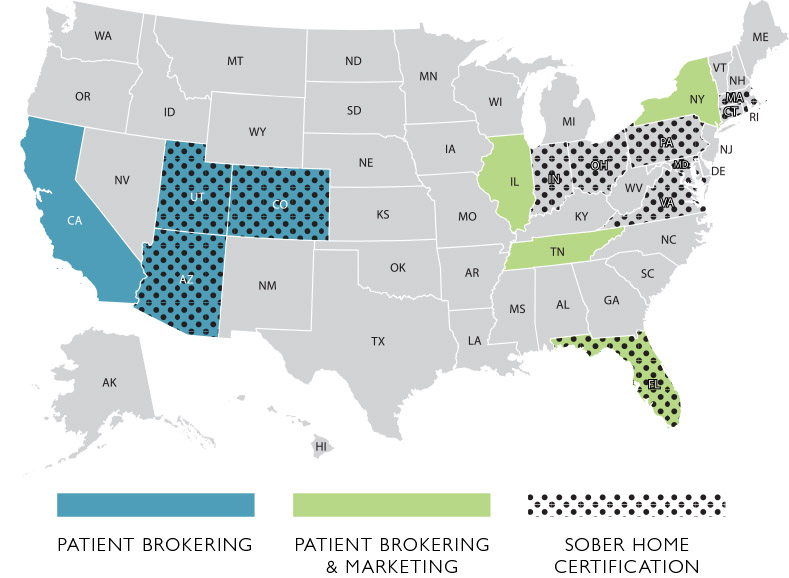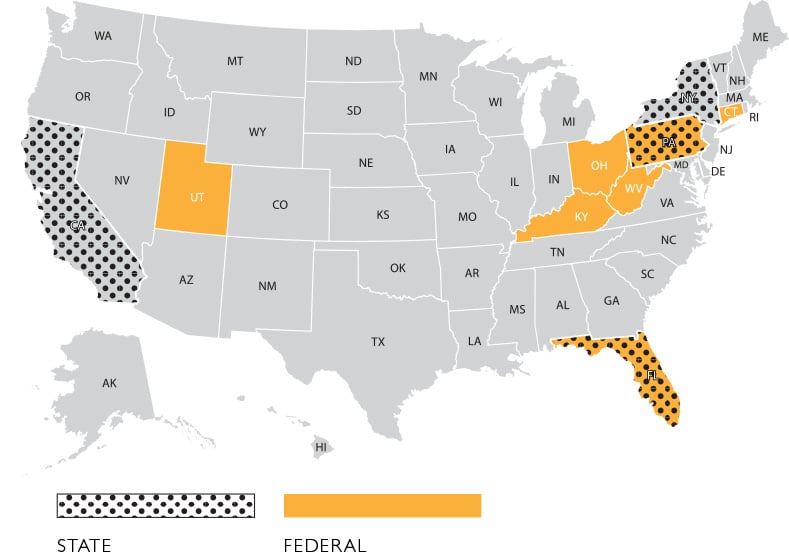The opioid epidemic is causing a rise in the number of treatment centers and recovery residences that offer services for people with substance use disorder (SUD). SUD treatment and recovery entities are less regulated than other health care settings, creating an opportunity for unethical individuals and corporations to profit off of fraudulent and substandard care. In response, many state lawmakers are moving to protect the SUD population from deceptive and ineffective care.
SUD Treatment Center and Recovery Residence Fraud and Abuse: State Laws
This state law tracker is current as of May 20, 2019 and will be updated monthly. As legislative activities in the SUD treatment and recovery space are rapidly evolving, Faegre Baker Daniels Consulting cannot ensure that the information presented is comprehensive. For the latest developments on these and related issues, please reach out to Matthew Rubin.
The map below captures states that have enacted laws targeting unethical practices in SUD treatment and recovery, including deceptive marketing and patient brokering (in which unlicensed “patient brokers” are paid by unethical SUD providers or recovery residences to deliver patients or residents). The map also captures states that have adopted laws concerning licensure of recovery residences. In this tracker, "recovery residence" includes all group-based, drug-free housing intended to facilitate recovery; state laws often differ in the terminology used for such entities.
SUD Treatment Center and Recovery Residence Laws, by State

| ARIZONA |
S.B. 1451 – Crimes and Offenses – Health Care Providers – Patient Referrals
S.B. 1465 – Alcoholics and Chemically Dependent Persons – Residential Facilities – Sober Living Homes |
|
| CALIFORNIA | S.B. 1228 - Alcoholism or Drug Abuse Recovery and Treatment Services: Referrals | |
| COLORADO | H.B. 1009 – Substance Use Disorders Recovery | |
| CONNECTICUT | H.B. 5149 - Alcoholics and Chemically Dependent Persons – Halfway Houses | |
| FLORIDA |
H.B. 807 – Prohibition of Deceptive Marketing Practices H.B. 807 – Patient Brokering Prohibited; Exceptions; Penalties H.B. 21 – Voluntary Certification of Recovery Residences |
|
| ILLINOIS |
H.B. 4949 – Prohibition Against Fee Splitting H.B. 4949 – Deceptive Marketing, Advertising, and Sale of Mental Health Disorder and Substance Use Disorder Treatment |
|
| INDIANA | S.B. 402 – Recovery Residences and County Homes | |
| MARYLAND | H.B. 1411 – Health Recovery Residences - Certification | |
| MASSACHUSETTS | H. 1828 – Ensuring the Safety of Sober Homes | |
| NEW YORK | A. 7689-A – Prohibited Practices by Providers of Substance Use Disorder Services | |
| OHIO | H.B. 483 – Recovery Housing | |
| PENNSYLVANIA | S.B. 446 – Standards for Drug and Alcohol Recovery Homes | |
| RHODE ISLAND | S. 2579 – Relating to Behavioral Healthcare, Developmental Disabilities and Hospitals | |
| TENNESSEE | H.B. 2068 – Substance Abuse – Treatment – Markets and Marketing | |
| UTAH | H.B. 14 – Substance Abuse Treatment Facility Patient Brokering | |
| VIRGINIA | H.B. 2045 – Alcoholics and Chemically Dependent Persons – Group Homes – Recovery Residences |
SUD Treatment Center and Recovery Residence Fraud and Abuse: State and Federal Criminal Charges
This tracker is current as of May 20, 2019 and will be updated monthly. As law enforcement activities in the SUD treatment and recovery space are rapidly evolving, Faegre Baker Daniels Consulting cannot ensure that the information presented is comprehensive. For the latest developments on these and related issues, please reach out to Matthew Rubin.
Federal and state governments are increasingly responding to unethical SUD providers, patient brokers and recovery residence administrators with criminal charges. The map below captures states that are prosecuting individuals involved in patient brokering schemes, deceptive marketing of SUD services and insurance fraud.
The map also captures states in which a U.S. District Attorney’s Office has brought criminal charges against individuals allegedly involved in SUD-related crimes. Many federal criminal charges arising from patient brokering schemes have been health care fraud related, including conspiracy to commit health care fraud. This is because, until recently, the federal government has not had enforcement authority over individuals who offer, solicit or accept kickbacks in exchange for referrals of privately insured patients. The most recent iteration of comprehensive opioid legislation passed in October 2018, commonly referred to as the “SUPPORT Act,” now expands the reach of the federal government to prosecute kickback schemes involving privately insured patients in recovery residences, clinical treatment facilities or laboratories.
SUD Treatment Center and Recovery Residence Criminal Charges, by State

.svg?rev=a492cc1069df46bdab38f8cb66573f1c&hash=2617C9FE8A7B0BD1C43269B5D5ED9AE2)
